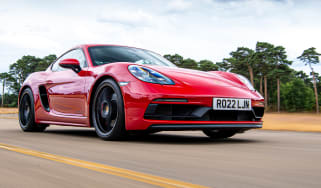Porsche Cayman coupe (2013-2016) - MPG, running costs & CO2
The Porsche Cayman wasn’t built to be economical, but it’s not too expensive to run when you consider the performance on offer
Porsche Cayman MPG & CO2
The latest Cayman model is said to be 15% more efficient than the old one and much of that is down to the car’s lower weight. The difference between the basic Cayman and Cayman S is only marginal, but the entry-level car’s 2.7-litre engine is slightly more economical than the 3.4-litre in the S.
The smaller engine returns 34.4mpg, while going for the hi-tech PDK automatic gearbox improves economy by just over 2mpg. The difference between the two isn't substantial in efficiency terms, so the most economical version of both models costs £265 to tax a year.
The Cayman S is also more economical with an automatic gearbox (returning 35.3mpg versus the manual’s 32.1mpg), while the auto’s road tax bill of £265 a year is £20 cheaper than that of the manual.
The Cayman GTS has the same fuel-economy figures as the Cayman S, while the extreme, track-focused Cayman GT4 with its larger 3.8-litre engine officially returns 27.4mpg and has CO2 emissions of 238g/km, for much higher road tax of £490 a year.
Insurance groups
The standard Cayman falls into insurance group 37, while the Cayman S is in group 41 and the Cayman GTS in group 43. Given the power and purpose of the car, the new GT4 is likely to be in the highest insurance group.
Servicing
A combination of Porsche’s ‘premium’ brand status, the technology used in its cars and the quality of components fitted to them means they’re never cheap to service. Consumables like tyres and brake pads will cost a lot to replace and if you drive the car hard often, you’ll wear through these fairly regularly.
Warranty
Like rivals Mercedes, Aston Martin and Jaguar, Porsche offers a three-year/unlimited-mileage warranty on all its new cars.












